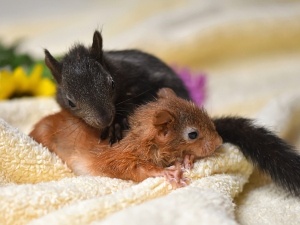
Dehydration can kill baby squirrels, baby squirrels in the wild get most of their water from their mother’s milk, this milk keeps squirrels well hydrated as they grow.
If you find an orphaned baby squirrel then it is likely dehydrated. This article explains how to tell if a baby squirrel is dehydrated.
Table of Contents
How to tell if a baby squirrel is dehydrated:
Skin pinch:
How the baby’s skin goes down after you pinch it will let you know if the baby is dehydrated. Test the baby’s level of dehydration by pinching the skin on the baby’s stomach, or, the skin on the back of the baby’s neck.
If the skin goes down after 1-2 seconds then the baby is moderately dehydrated. If the baby’s skin goes back after 4 seconds or more, then the baby is severely dehydrated.
Appearance:
Squirrels are meant to have plump arms and legs, as well as a rounded, but not bloated, belly. Their skin should not look loose or wrinkled and the animal should not look emaciated.
If the baby’s skin looks loose, dry, and wrinkled, and if the baby’s body is thin and emaciated, then the squirrel is likely dehydrated.
Can’t urinate:
Baby squirrels urinate quite often, especially after feedings. If you stimulate the baby to urinate, and it can’t urinate after many tries, or if the urine is a dark brown color, then you can assume that the baby is dehydrated.
Other signs:
A healthy squirrel is meant to have bright eyes and moist mucus membranes. If the squirrel’s eyes are dull and dry, and if the animal’s mucus membranes are dry and sticky, then the animal is likely dehydrated.
How to rehydrate a baby squirrel:
You can rehydrate your baby squirrel using Pedialyte or a mixture made up of water with sugar, dextrose, or glucose.
Pedialyte as a rehydration solution:
Rehydrating the baby squirrel using Pedialyte is an option but a downside of doing this is that this product contains preservatives that are designed for human consumption, they are not necessarily for squirrel consumption.
The dyes and flavoring in this product don’t necessarily benefit the squirrel either. In cases where autopsies were done, some squirrels that were fed Pedialyte developed crystals in their kidneys.
Because Pedialyte contains sodium, it should not be given to baby squirrels for longer than 24-48 hours. Also, it needs to be mixed with water (one part water, one part Pedialyte) to dilute it because it is high in sugar
Water and sugar/glucose/dextrose as a rehydration solution
Rehydrating the baby squirrel using a solution made up of water and sugar/dextrose/glucose is beneficial because there are no preservatives in this solution.
The animal’s body can easily use the sugar in this solution and their body doesn’t have to process any chemicals, dyes, or flavorings, this makes processing easier. This mixture can be made using 1 cup of warm water and 1 tsp of sugar.
Before you try to rehydrate your baby squirrel, make sure that the fluids that you’re about to give the squirrel are warm, and make sure that the squirrel is warm too. Feeding a chilled baby squirrel can kill the baby.
Tools needed:
Baby squirrels should be fed fluids in small amounts, if you feed the baby too much fluid, and the baby inhales the fluid, then the baby can aspirate and develop aspiration pneumonia.
To avoid this, feed the baby squirrel using a 1 cc syringe with a Cactac nipple attached, you can find these at the pharmacy. You can also order these online where they sell pet supplies.
What not to rehydrate squirrels with:
Squirrels should absolutely not be given Gatorade as a rehydrating solution. This drink causes squirrel kidneys to become blue and form crystals, it also causes inflammation of the kidneys and blockages in the kidneys.
If your baby squirrel is dehydrated, do not mix the baby’s formula with Pedialyte. Follow the instructions on the formula packaging to a T and only mix the formula powder with plain water.
How often should I hydrate a baby squirrel?
The squirrel should be given as much hydration as it will drink, but it should still only be given a few drops at a time. You can give the baby rehydration fluids about every hour if the baby is severely dehydrated.
Pinch the baby’s skin as you hydrate to test its levels of hydration.
If you enjoyed this article then you may also be interested in other bird related articles. Here are some articles that you may be interested in: Baby Squirrel Twitching In Sleep, Baby Squirrel Bloated Stomach, How To Stop Diarrhea In Baby Squirrels, Baby Squirrel Constipated

